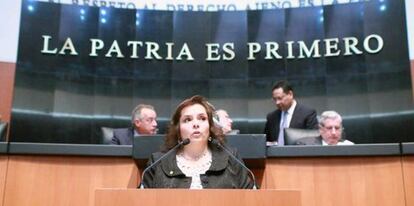“They do the job that the authorities should be doing”


In the middle of the powder keg that is now the western state of Michoacan Congresswoman Selene Vázquez raises her voice to denounce the ungovernability and violence in the region and plead on behalf of neighborhood self-defense groups. These units, often heavily armed, have been sprouting up in various communities as a form of protection against siege, violence and extortion by organized crime organizations. Vázquez argues that they live in a "state of siege" and if they go about unarmed "they know that they might not come back." The congresswoman says that they have lost count of the number of deaths in the province.
Question. How would you define the situation in Michoacan?
Answer. Some areas in a state of war. The people know that if they go about unarmed they may not come back. There is a state of siege in areas where communities have organized to defend themselves because they cannot leave. Criminal groups realize how difficult it is for the State to fulfill its duty and that residents are doing the job that the authorities should be doing. A large part of Michoacán is in a state of emergency. There is a wave of organized crime throughout the entire territory - kidnappings and kickback payments.
Q. What is the role of the self-defense groups?
A. I have toured many indigenous communities where there are watch groups. The people are friendly. To be honest I see them almost happy because even though they miss out on sleep so that they can stay on guard, and even though they are worried, in the end, they are free from extortion and free from shameless robbery [by the criminals]. There hasn't been a kidnapping in those communities in the last six months. They are shuttered but free.
Q. There are rumors about who may be behind these groups. Do you think they are all authentic?
A. I think they are all authentic but there are some stronger than others. Those who have the full support of the community are more peaceful. There are other areas where there are disputes between groups and that weakens the process. Then there is La Ruana, a community that I think is very strong, but there the ones up in arms are the poor. The rich do not join in.
Q. Do you think it's a legitimate use of arms?
A. That's the point. Self-defense is legitimate. Weapons cause a lot of problems and they carry a risk but the criminals are heavily armed so they cannot face them with little pistols. In Michoacan people have always used guns to hunt or for security. But, it's true that now many of them have illegal weapons. It's important to note that the self-defense groups have sometimes collaborated with authorities and they have told them about hidden places. The people have been honest and in the villages where there are [drug] labs they have paved the way for the government. Most Michoacanos are armed. It's a question of war. And, in war you don't care about the type of gun. All's fair in war.
Q. Is the government doing everything it can in the region?
A. No. They could always do more. Michoacan has been militarized since Felipe Calderón's time. The thing is that vigilante groups call the military when there is an emergency. The army is there for a while and then they leave. They leave them at the mercy of these gentlemen. They just pass through.
Q. Some locals say that municipal politicians are protecting the drug lords. Is that true?
A. Yes, but that's not just in Michoacan. I'm not the only one to say so. There have been complaints from PAN and PRD because it was clear that criminal groups had acted in support of the PRI. In past elections - even though it's no longer announced - candidates from every party have withdrawn because of threats.
Q. You are the first politician to publicly defend the self-defense groups. Are you scared?
A. I don't know how to live in fear and I don't want to. I don't owe anybody anything. I haven't hurt anyone. I have tried to live my life rightly and one of the right things to do is to say what you think. Otherwise it doesn't make sense to be in politics. Any public servant who thinks more about taking care of his own affairs more than the general good should not get into politics. Politics is a duty to others.
Q. Have you received any threats?
A. Never.
Translation: Dyane Jean François
Tu suscripción se está usando en otro dispositivo
¿Quieres añadir otro usuario a tu suscripción?
Si continúas leyendo en este dispositivo, no se podrá leer en el otro.
FlechaTu suscripción se está usando en otro dispositivo y solo puedes acceder a EL PAÍS desde un dispositivo a la vez.
Si quieres compartir tu cuenta, cambia tu suscripción a la modalidad Premium, así podrás añadir otro usuario. Cada uno accederá con su propia cuenta de email, lo que os permitirá personalizar vuestra experiencia en EL PAÍS.
¿Tienes una suscripción de empresa? Accede aquí para contratar más cuentas.
En el caso de no saber quién está usando tu cuenta, te recomendamos cambiar tu contraseña aquí.
Si decides continuar compartiendo tu cuenta, este mensaje se mostrará en tu dispositivo y en el de la otra persona que está usando tu cuenta de forma indefinida, afectando a tu experiencia de lectura. Puedes consultar aquí los términos y condiciones de la suscripción digital.








































